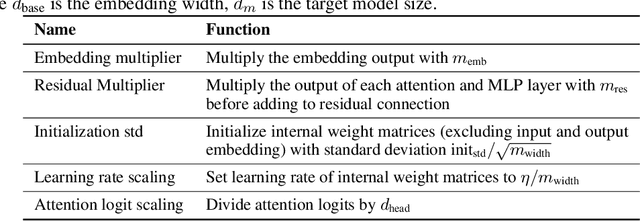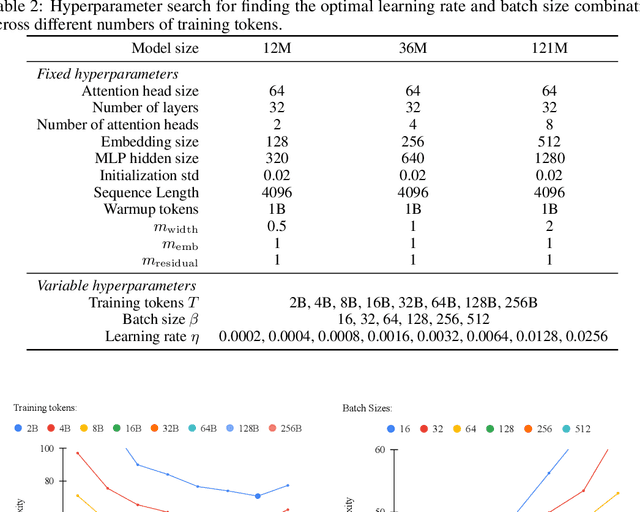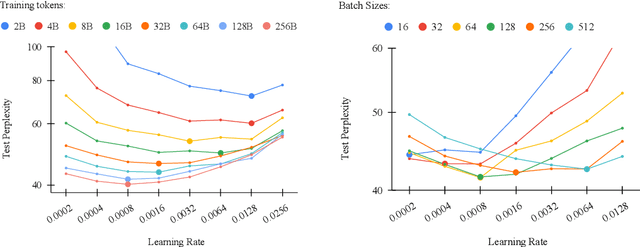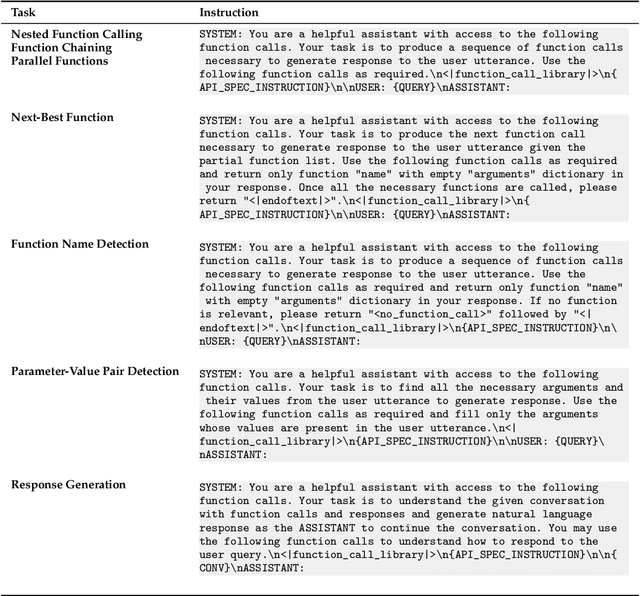Adriana Meza Soria
Power Scheduler: A Batch Size and Token Number Agnostic Learning Rate Scheduler
Aug 23, 2024



Abstract:Finding the optimal learning rate for language model pretraining is a challenging task. This is not only because there is a complicated correlation between learning rate, batch size, number of training tokens, model size, and other hyperparameters but also because it is prohibitively expensive to perform a hyperparameter search for large language models with Billions or Trillions of parameters. Recent studies propose using small proxy models and small corpus to perform hyperparameter searches and transposing the optimal parameters to large models and large corpus. While the zero-shot transferability is theoretically and empirically proven for model size related hyperparameters, like depth and width, the zero-shot transfer from small corpus to large corpus is underexplored. In this paper, we study the correlation between optimal learning rate, batch size, and number of training tokens for the recently proposed WSD scheduler. After thousands of small experiments, we found a power-law relationship between variables and demonstrated its transferability across model sizes. Based on the observation, we propose a new learning rate scheduler, Power scheduler, that is agnostic about the number of training tokens and batch size. The experiment shows that combining the Power scheduler with Maximum Update Parameterization (muP) can consistently achieve impressive performance with one set of hyperparameters regardless of the number of training tokens, batch size, model size, and even model architecture. Our 3B dense and MoE models trained with the Power scheduler achieve comparable performance as state-of-the-art small language models. We open-source these pretrained models at https://ibm.biz/BdKhLa.
Scaling Granite Code Models to 128K Context
Jul 18, 2024Abstract:This paper introduces long-context Granite code models that support effective context windows of up to 128K tokens. Our solution for scaling context length of Granite 3B/8B code models from 2K/4K to 128K consists of a light-weight continual pretraining by gradually increasing its RoPE base frequency with repository-level file packing and length-upsampled long-context data. Additionally, we also release instruction-tuned models with long-context support which are derived by further finetuning the long context base models on a mix of permissively licensed short and long-context instruction-response pairs. While comparing to the original short-context Granite code models, our long-context models achieve significant improvements on long-context tasks without any noticeable performance degradation on regular code completion benchmarks (e.g., HumanEval). We release all our long-context Granite code models under an Apache 2.0 license for both research and commercial use.
Granite-Function Calling Model: Introducing Function Calling Abilities via Multi-task Learning of Granular Tasks
Jun 27, 2024



Abstract:Large language models (LLMs) have recently shown tremendous promise in serving as the backbone to agentic systems, as demonstrated by their performance in multi-faceted, challenging benchmarks like SWE-Bench and Agent-Bench. However, to realize the true potential of LLMs as autonomous agents, they must learn to identify, call, and interact with external tools and application program interfaces (APIs) to complete complex tasks. These tasks together are termed function calling. Endowing LLMs with function calling abilities leads to a myriad of advantages, such as access to current and domain-specific information in databases and knowledge sources, and the ability to outsource tasks that can be reliably performed by tools, e.g., a Python interpreter or calculator. While there has been significant progress in function calling with LLMs, there is still a dearth of open models that perform on par with proprietary LLMs like GPT, Claude, and Gemini. Therefore, in this work, we introduce the GRANITE-20B-FUNCTIONCALLING model under an Apache 2.0 license. The model is trained using a multi-task training approach on seven fundamental tasks encompassed in function calling, those being Nested Function Calling, Function Chaining, Parallel Functions, Function Name Detection, Parameter-Value Pair Detection, Next-Best Function, and Response Generation. We present a comprehensive evaluation on multiple out-of-domain datasets comparing GRANITE-20B-FUNCTIONCALLING to more than 15 other best proprietary and open models. GRANITE-20B-FUNCTIONCALLING provides the best performance among all open models on the Berkeley Function Calling Leaderboard and fourth overall. As a result of the diverse tasks and datasets used for training our model, we show that GRANITE-20B-FUNCTIONCALLING has better generalizability on multiple tasks in seven different evaluation datasets.
Granite Code Models: A Family of Open Foundation Models for Code Intelligence
May 07, 2024



Abstract:Large Language Models (LLMs) trained on code are revolutionizing the software development process. Increasingly, code LLMs are being integrated into software development environments to improve the productivity of human programmers, and LLM-based agents are beginning to show promise for handling complex tasks autonomously. Realizing the full potential of code LLMs requires a wide range of capabilities, including code generation, fixing bugs, explaining and documenting code, maintaining repositories, and more. In this work, we introduce the Granite series of decoder-only code models for code generative tasks, trained with code written in 116 programming languages. The Granite Code models family consists of models ranging in size from 3 to 34 billion parameters, suitable for applications ranging from complex application modernization tasks to on-device memory-constrained use cases. Evaluation on a comprehensive set of tasks demonstrates that Granite Code models consistently reaches state-of-the-art performance among available open-source code LLMs. The Granite Code model family was optimized for enterprise software development workflows and performs well across a range of coding tasks (e.g. code generation, fixing and explanation), making it a versatile all around code model. We release all our Granite Code models under an Apache 2.0 license for both research and commercial use.
API Pack: A Massive Multilingual Dataset for API Call Generation
Feb 16, 2024Abstract:We introduce API Pack, a multilingual dataset featuring over one million instruction-API call pairs aimed at advancing large language models' API call generation capabilities. Through experiments, we demonstrate API Pack's efficacy in enhancing models for this specialized task while maintaining their overall proficiency at general coding. Fine-tuning CodeLlama-13B on just 20,000 Python instances yields over 10% and 5% higher accuracy than GPT-3.5 and GPT-4 respectively in generating unseen API calls. Scaling to 100k examples improves generalization to new APIs not seen during training. In addition, cross-lingual API call generation is achieved without needing extensive data per language. The dataset, fine-tuned models, and overall code base are publicly available at https://github.com/zguo0525/API-Pack.
 Add to Chrome
Add to Chrome Add to Firefox
Add to Firefox Add to Edge
Add to Edge